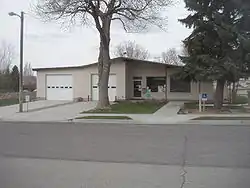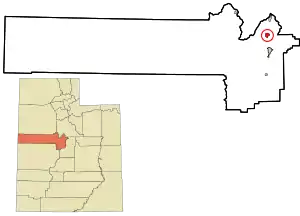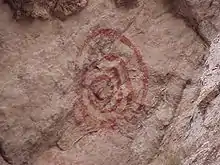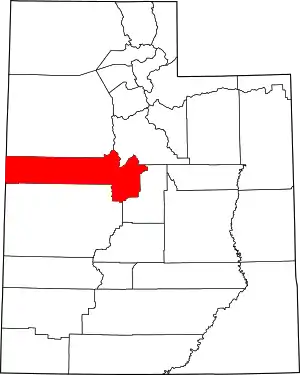Mona, Utah
Mona is a city in Juab County, Utah, United States. As of the 2010 census it had a population of 1,547.[6] It is part of the Provo–Orem metropolitan area.
Mona, Utah | |
|---|---|
 Mona city office | |
 Location in Juab County and state of Utah | |
| Coordinates: 39°48′55″N 111°51′23″W | |
| Country | United States |
| State | Utah |
| County | Juab |
| Settled | 1852 |
| Incorporated | 1924 |
| Became a city | April 1, 2001 |
| Named for | Isle of Man |
| Government | |
| • Mayor | Bill Mills[1] |
| Area | |
| • Total | 2.62 sq mi (6.79 km2) |
| • Land | 2.59 sq mi (6.71 km2) |
| • Water | 0.03 sq mi (0.08 km2) |
| Elevation | 4,970 ft (1,515 m) |
| Population (2010) | |
| • Total | 1,547 |
| • Estimate (2019)[3] | 1,807 |
| • Density | 697.68/sq mi (269.40/km2) |
| Time zone | UTC-7 (Mountain (MST)) |
| • Summer (DST) | UTC-6 (MDT) |
| ZIP code | 84645 |
| Area code(s) | 435 |
| FIPS code | 49-51140[4] |
| GNIS feature ID | 1443548[5] |
| Website | www |
The city is about halfway between Santaquin and Nephi along Interstate 15. The population was 850 at the 2000 census, which at the time was sufficient under Utah state law for Mona to become a city.[7] It did so in 2001.
A farm owned by Young Living raises 200 acres (0.81 km2) of lavender on the north side of town.[8] Mona is known for its annual Lavender Festival.
History
Mona, one of the early settlements along the old Arrowhead Trail, was originally settled in 1852. First named Clover Creek for patches of wild clover that grew along the creek in the area, it was later renamed Willow Creek for its water source, then Starr for a local settler, before receiving its present name.
When he was a traveling worker and singer in the early 1930s, Burl Ives was once jailed in Mona for singing "Foggy Foggy Dew", because it was considered bawdy by the authorities.[9]

Geography
Mona is located in northeastern Juab County at 39°48′55″N 111°51′23″W (39.815392, -111.856354).[10] Interstate 15 passes along the eastern edge of the city limits, with access from Exit 233. I-15 leads north 12 miles (19 km) to Santaquin and 33 miles (53 km) to Provo, while to the south it leads 9 miles (14 km) to Nephi.
According to the United States Census Bureau, Mona has a total area of 2.8 square miles (7.3 km2), of which 0.04 square miles (0.1 km2), or 1.50%, are water.[6] Part of the Mona Reservoir is in the northwest corner of the city. The reservoir is an impoundment on Currant Creek, which flows north to Utah Lake.
Mount Nebo, the southernmost and highest mountain in the Wasatch Range, rises 5 miles (8 km) east of Mona to an elevation of 11,928 feet (3,636 m).
| Historical population | |||
|---|---|---|---|
| Census | Pop. | %± | |
| 1870 | 315 | — | |
| 1880 | 503 | 59.7% | |
| 1890 | 469 | −6.8% | |
| 1900 | 469 | 0.0% | |
| 1910 | 467 | −0.4% | |
| 1920 | 408 | −12.6% | |
| 1930 | 338 | −17.2% | |
| 1940 | 357 | 5.6% | |
| 1950 | 328 | −8.1% | |
| 1960 | 347 | 5.8% | |
| 1970 | 309 | −11.0% | |
| 1980 | 536 | 73.5% | |
| 1990 | 584 | 9.0% | |
| 2000 | 850 | 45.5% | |
| 2010 | 1,547 | 82.0% | |
| 2019 (est.) | 1,807 | [3] | 16.8% |
| U.S. Decennial Census[11] | |||
Demographics
As of the census[4] of 2000, there were 850 people, 232 households, and 203 families residing in the town. The population density was 614.1 people per square mile (237.8/km2). There were 243 housing units at an average density of 175.5 per square mile (68.0/km2). The racial makeup of the town was 98.24% White, 0.35% Native American, 0.12% Asian, 0.12% from other races, and 1.18% from two or more races. Hispanic or Latino of any race were 1.41% of the population.
There were 232 households, out of which 53.0% had children under the age of 18 living with them, 77.2% were married couples living together, 6.9% had a female householder with no husband present, and 12.1% were non-families. 9.9% of all households were made up of individuals, and 6.0% had someone living alone who was 65 years of age or older. The average household size was 3.66 and the average family size was 3.97.
In the town the population was spread out, with 40.7% under the age of 18, 10.2% from 18 to 24, 25.4% from 25 to 44, 16.6% from 45 to 64, and 7.1% who were 65 years of age or older. The median age was 24 years. For every 100 females, there were 95.0 males. For every 100 females age 18 and over, there were 96.1 males.
The median income for a household in the town was $49,464, and the median income for a family was $50,625. Males had a median income of $35,982 versus $22,222 for females. The per capita income for the town was $14,474. About 0.5% of families and 2.4% of the population were below the poverty line, including 2.3% of those under age 18 and none of those age 65 or over.
See also
- List of cities and towns in Utah
References
- "Mona City Council - Mona City". monacity.org. Retrieved 2019-12-23.
- "2019 U.S. Gazetteer Files". United States Census Bureau. Retrieved August 7, 2020.
- "Population and Housing Unit Estimates". United States Census Bureau. May 24, 2020. Retrieved May 27, 2020.
- "U.S. Census website". United States Census Bureau. Retrieved 2008-01-31.
- "US Board on Geographic Names". United States Geological Survey. 2007-10-25. Retrieved 2008-01-31.
- "Geographic Identifiers: 2010 Demographic Profile Data (G001): Mona city, Utah". U.S. Census Bureau, American Factfinder. Retrieved December 28, 2018.
- Trauntvein, Myrna (December 9, 2000). "Mona is now a third-class city". Deseret News. p. A18. Retrieved June 17, 2009.
- Young Living Farms Lavender Farm
- Burl Ives (1948). Wayfaring Stranger. New York: Whittlesey House, p 129-132
- "US Gazetteer files: 2010, 2000, and 1990". United States Census Bureau. 2011-02-12. Retrieved 2011-04-23.
- "Census of Population and Housing". Census.gov. Retrieved June 4, 2015.
